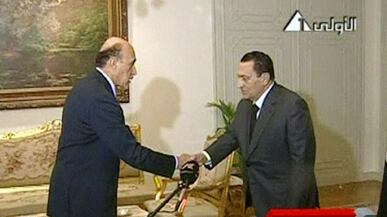In tapping General Omar Suleiman as his vice president, Egyptian President Mubarak has effectively decided on his successor—apparently cutting his son out of the action. John Barry on the power waiting in the wings. Plus, full coverage of the Egypt uprising.
"The Egyptian government can't reshuffle the deck and then stand pat," State Department spokesman P.J.Crowley said in a message he circulated on Twitter after President Mubarak announced he had fired his government. "President Mubarak's words pledging reform must be followed by action."
Now Mubarak has acted—but whether Washington or, more importantly, the demonstrators still thronging Egypt's streets will regard his moves as a mere reshuffling of the deck is unclear. Today, Mubarak announced the appointment of his longtime intelligence chief, General Omar Suleiman, as vice-president and named Ahmed Shafik, aviation minister in the just-departed government, as prime minister of a new cabinet that first reports suggest will be composed largely of technocrats.
Photos: Egypt Protests

In the past, Mubarak had made no secret of his dream of passing the presidency to his son, Gamal, who has no military background. In nominating Suleiman as vice president, Mubarak has publicly—and humiliatingly—abandoned Gamal, given that, since Mubarak is 82-years-old and not in good health, he has effectively named the 74-year-old Suleiman as his successor.
Suleiman's career parallels the arc of modern Egyptian history. Born in 1936 into a poor but deeply pious family in one of the poorest provinces in Egypt, Suleiman was accepted at the Cairo military academy in 1954. He served in the 1967 and 1973 wars against Israel, and during the 1960s, the heyday of Egypt's relationship with the Soviet Union, studied at the Frunze Military Academy in Moscow.
When the United States replaced the Soviet Union as Egypt's patron, Suleiman studied at the U.S. Special Warfare School at Fort Bragg. But his career really took off when, during the 1980s, he switched from the infantry to military intelligence, eventually rising to become deputy head of military intelligence in 1986—a job that brought him into direct contact with President Mubarak. Tall, slightly stooping, and with an iron-gray military moustache, Suleiman clearly impressed Mubarak because in 1993 the president appointed him head of Egypt's General Intelligence Service, a job he has held ever since.
During the last decade, Egypt's spymaster has been trusted with a series of increasingly sensitive diplomatic assignments, most notably the successful effort to broker the cease-fire with Israel
A failed assassination attempt in Addis Ababa in 1995 sealed the personal bond between the two men. Mubarak and Suleiman survived the ambush only because both were riding in the armored limousine Suleiman had insisted Mubarak bring to Ethiopia
During the last decade, Egypt's spymaster has been trusted with a series of increasingly sensitive diplomatic assignments, most notably the successful effort to broker the cease-fire with Israel that ended the Palestinians' Second Intifada, after some 5,500 Palestinians and 1,100 Israelis had been killed. Suleiman's deftness and ability to win the trust of all parties have earned him high marks in Israel. Since 9/11, he has earned the same regard in Washington, becoming one of America's most indispensable allies in the struggle against Al Qaeda.
So, at one level, the choice is not surprising. As head of the Mukhabarat, as Egypt's vast General Intelligence Service is commonly known, Suleiman has been in many respects the second most powerful man in Egypt for close to twenty years. And, given the sensitivity of his job, it goes without saying that Suleiman is extremely close to Mubarak politically as well as personally—so close he has long been seen as the most influential of the small circle whom Mubarak trusts. At another level, though, the relevant point about Suleiman is that he is a military man—and thus acceptable to the army on whose loyalty Mubarak is now relying to contain the demonstrations racking Egypt.
The question intriguing analysts in Washington is whether Suleiman's appointment is part of a deal. Has Mubarak, facing this crisis, had to strike a bargain with his Army commanders in return for their loyalty in helping to contain the revolt? "We can't know for certain yet," says Steven Cook, an expert on Egypt's military at the Council on Foreign Relations. "But it is entirely possible that the Army said to Mubarak: 'Egypt is on the brink. You appoint Suleiman as vice-president; and we will enforce martial law if necessary.'" Cook points out that in the last big street demonstrations against Anwar Sadat's regime—the so-called bread riots of 1977—the Army insisted that Sadat restore the subsidies on food prices before they would act to suppress the demonstrations.
Whether Suleiman can exercise his famous diplomatic skills and successfully stitch together the fabric of Egypt's frayed society is a question that will now be watched closely in Washington and Tel Aviv.
John Barry joined Newsweek's Washington bureau as national security correspondent in July 1985. He has reported extensively on American intervention in Afghanistan, Kosovo, Haiti, Bosnia, Iraq and Somalia and efforts for peace in the Middle East. In 2002, he co-wrote "The War Crimes of Afghanistan" (8/26/02 cover) which won a National Headliner Award and was a finalist in the ASME National Magazine Awards for public service and a finalist in the SPJ Deadline Club Award for investigative reporting.






